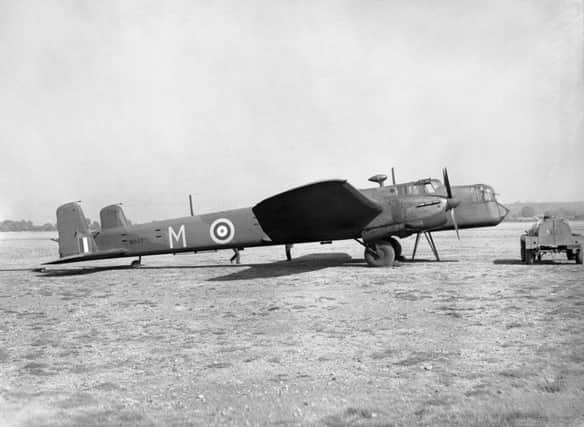RAF hero's message to the enemy


One such crewmen was South Shields born Bert Llewellyn Henry, as local historian Dorothy Ramser reveals in her latest wartime research.
Born in 1921 to Stanley Henry and dance school principal Gladys Winch (Bailey), Bert was serving with Bomber Command in 10 Squadron as a wireless operator/air gunner when hostilities broke out.
Advertisement
Hide AdAdvertisement
Hide AdAnd just a month after war was declared, he was flying in an Armstrong-Whitworth Whitley bomber on his way to Berlin to carry out a “nickel” raid – in other words, dropping propaganda leaflets on the German capital.
“The squadron was actually the first to visit the city in wartime,” wrote Dorothy, who went on to reveal the detail of the leaflets dropped by the RAF.
They conveyed the following message:
“German men and women, the Government of the Reich has, with cold deliberation, forced war upon Great Britain.
“They have done so knowing that it must involve mankind in a calamity worse than that of 1914. The assurances of peaceful intentions the Fuhrer gave to you and to the world in April have proved worthless.
Advertisement
Hide AdAdvertisement
Hide Ad“President Roosevelt offered you both peace with honour and the prospect of prosperity. Instead your rulers have condemned you to massacre, miseries and privation of a war they cannot hope to win.
“It is not us but you they have deceived. For years their iron censorship has kept you from the truth. It has imprisoned your minds in, as it were a concentration camp.
“We have no enmity against you the German people ... you have not the means to sustain protracted warfare ... we are too strong to break by blows and we could wear you down inexorably. You the German people, can, if you will, insist on peace at any time.”
However, as Dorothy explains, the Nazi propaganda machine reacted in a predictable manner and claimed that the inhabitants of Berlin had slept “very well” and saw nothing of the RAF planes, and that it must have been a dream of the British.
Advertisement
Hide AdAdvertisement
Hide AdShortly after, the King visited RAF Dishforth in North Yorkshire, where Bert was stationed, inspecting the bombers and their crews.
On January 4, 1940, two of the squadron’s crews were ordered on another leaflet drop, this time over Bremen. Bert was acting as air gunner in the raid, which almost ended in disaster when, coming in to land, the bomber clipped a line of trees, causing the plane’s undercarriage to collapse.
Luckily, the crew was left bruised and shaken but otherwise unhurt.
“The squadron’s first bombing mission of the war was on the evening of March 19-20, 1940, when eight Whitley aircraft, each carrying 1,500 pounds of bombs, attacked the German mine-laying seaplane base at Hornum, on the island of Sylt, situated in the Frisian Isles of the North Sea,” writes Dorothy.
Advertisement
Hide AdAdvertisement
Hide Ad“The British Air Ministry announced that the raid, in reprisal for the attack on Scapa Flow, caused severe damage to the base.
“Gladys would have had no idea if young Bert was involved that day, but they must have been very worried for the safety of the 19-year-old.”
On June 10, 1940, Italy declared war on Britain – and the very next night, Bert’s squadron attacked the Fiat works in Turin.
“The airmen had to use oxygen as they flew over the Alps whilst freezing temperatures made ice form on the wings and fuselages.
Advertisement
Hide AdAdvertisement
Hide Ad“However, the attack took the Italians completely by surprise and resulted in a vast explosion and an up-rush of bright sparks like a fireworks display.”
Just days later, Bert was acting as wireless operator for a sortie on heavily defended Frankfurt.
“They came under intense and sustained fire from enemy flak and the aircraft was badly damaged. Fortunately they were able to return back to base safely – yet another lucky escape for Bert Henry of South Shields.”
But the heroic teenager was not so lucky when he and crew members were flying back from Le Havre on October 14 and their plane struck a barrage balloon cable near Weybridge and crashed, tragically killing all on board.
Advertisement
Hide AdAdvertisement
Hide AdThe Shields Gazette’s story, headlined ‘Tynesider Killed on 41st Raid’, read: “A 19-year-old South Shields Airman has been killed whilst taking part in his 41st bombing raid on enemy territory. He is Sergeant Bert Llewellyn Henry, son of Mrs G Henry and grandson of Mr and Mrs B Bailey of Wellington Terrace. Official news of his death was received by his mother last Wednesday.
His mother ,better known as Madam Bailey, principal of the Premier School of Dance, had a letter from him on Saturday saying he was coming home on leave next Tuesday. Mrs Henry states that her son had taken part in some of the biggest bombing raids on Germany and Italy. Previously he had taken part in leaflet raids on Germany. On three occasions he served in bombers when the pilot officer gained a DFC.
“Bert is buried in military grave No. 1194 in Section O of Harton Cemetery, South Shields.”
It is a remarkable record of valour for one so young, and as with so many of his generation, his heroism and sacrifice must not be forgotten.